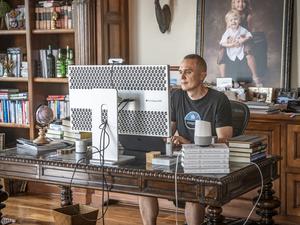
Matt Randall is eating oatmeal at Carpenters Hall inside a trendy new Austin hotel just south of downtown. There, he's diving into an overview of how his startup is adding health insurance to its existing life insurance product.
The new product launch, he explains, was planned months ago. But, because of complications getting approvals in key states, it just so happened launch day would have to be pushed back to Sept. 17. That happened to be the date his wife, Reiki therapist and former fashion model Amanda Huras, expected to have the couple’s first child – which they hadn't thought possible in the first place.
“My wife loved to joke around with everyone that we were having twins," Randall said.
As it happened, the couple's daughter came first. Then, a few days later, Spot launched its health insurance product, which provides supplemental coverage for injuries (not illnesses) up to $20,000 for $20 a month.
“We like to say, 'unless you’re going to go commit a crime in space, we’ll most likely cover you on everything.'"
So with two babies, Randall says he’s been crazy busy. That’s why he’s fitting an interview and breakfast into the same hour after a quick workout, which are becoming rarer these days.
Randall, who previously co-founded art startup Twyla, which he left in 2017, formed Spot after meeting New York Life executive Maria Miller. Miller later left the insurance giant to co-found Spot. They quickly raised an initial $2 million to fuel months of market research.
“There was no guarantee this company was getting off the ground," Randall said.
Spot initially launched earlier this year offering short-term life insurance starting at $7 per day -- largely targeting adventurous athletes and travelers taking significant risks. It also raised an additional $4 million round of funding led by Austin's Silverton Partners.
But even with plenty of financial runway, acquiring customers for low-cost short-term life insurance and getting into the injury insurance market were no sure bet.

“We knew the accident side was difficult because it’s regulated under health insurance, and that is just an absolute fucking bears' nest to try to go in to figure that side of it out," Randall said. "So we wanted to start with life insurance to test the market to see what is the opportunity.”
After launching its life insurance product, it continued working with state regulators to get Spot's injury coverage live for direct-to-consumer sales in 18 states.
Like anything, you have to read the fine print to know exactly how it works. But, generally, Spot pays for up to $20,000 in medical bills and rehab for any injury -- there are some exceptions for things such as injuries sustained while legally intoxicated or things that happen while committing a crime.
“We like to say, 'unless you’re going to go commit a crime in space, we’ll most likely cover you on everything.'" Randall said. "We don’t cover wing suiting or base jumping. So really anything where if you fail, you die, that’s what we don’t cover.”
The company sees its product largely as gap coverage that will help people who already have health care coverage pay their deductible, which is an average of around $5,000 for individuals and $8,000 for families. They present it as a subscription that you'd keep paying for -- because, as Randall says, injuries tend to happen when we don't expect them.
“We’re not a replacement for health insurance.”
Meanwhile, Spot is forming partnerships to bake its coverage into the list of purchase add-ons at ski resorts, marathons and other sporting destinations.
In some cases, resorts will just add Spot's coverage as an automatic to its guests, which moves some risk off the resort for common injuries. In other cases, such as Austin-area marathons, Spot's coverage is offered as an add on, and in some cases Spot share some of the revenue from those transactions with the event organizer.
Randall said Spot, which has 14 full-time employees, sees its product as transformational and a way to help more people avoid medical bankruptcy. He said many Americans have less than $500 in the bank, and a broken bone can push families into bankruptcy, even if they have health coverage.
While you see GoFundMe campaigns raising money for medical bills all the time, many fail to come close to paying the full bill, he said. Spot picked $20,000 for its coverage limit because he said that's enough to cover most expenses before typical health insurance plans start covering the majority of the bills. It was also a fit -- $20 a month for $20,000 in coverage (although it's more expensive in Texas due to regulations).
Two-thirds of people who file for bankruptcy say medical issues were the main reason their finances fell apart.
“It’s a real fucking problem that exists out there," Randall said. "Bankruptcy is no joke to people. Medical bills are no joke. Politicians love to sit out there and debate each other about what they're going to do and what's best for everyone. Our thing is, put something behind it. And if the number one reason is medical bills related to injuries… most people don’t have $500 in their bank, so a $20,000 bill bankrupts you."
For Spot, the biggest hurdle may simply be getting the word out and getting people comfortable with the idea of coverage that only covers injuries, whether sustained in a car wreck, making dinner or shredding down a mountainside.
“We’re not a replacement for health insurance," he said. "We’re not.”
Spot is continuing to target people with active lifestyles in the early days, and they've had several rock climbers, surfers and other adventure athletes sign on to be ambassadors for the product.
Randall said Spot is marketing itself like Red Bull and GoPro, which also target young and active people. And Spot has raised another $1 million or so, with plans to have roughly $3 million in additional funding in coming weeks. Much of that new funding is flowing from insurance companies that see Spot as a potential entry point for new customers.
“Where they see us long term is if we can be that top of the funnel getting people in just paying $20 a month," he said. "Being able to say, 'For an extra $12 a month we can offer X … the up sell opportunities across their product platforms are huge.”







